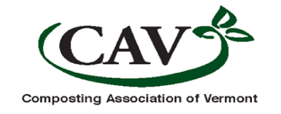Food Scrap Composting at Community Gardens
A Pilot Demonstration for Neighborhood-Scale Organics Management, in partnership with Vermont Community Gardens Network (VCGN), Northeast Recycling Council (NERC), participating Vermont Solid Waste Management Entities (SWMEs), and the Grassroots Fund. Funding generously provided by the High Meadows Fund.
Project Description
This three-year pilot project started with the establishment of three small-scale (≤ 100 cy/yr of all feedstocks), self-sustaining food scrap composting systems at community gardens in Vermont. In years two and three, CAV partnered with NERC, who took the lead on a USDA funded project implementing rural community composting in six states in which community composting systems were established at cohousing sites, schools, camps, and community gardens. As part of this project, resources for community composting training were developed.
These materials were subsequently crafted into a 5-module online training course to support further development of community composting sites.
To enhance these training resources, CAV is exploring funding options to expand this online material into a how-to manual and to develop outreach strategies to further normalize the practice of food scrap composting. The manual will build on the training materials, drawing from and referencing existing composting guides, in order to provide a valuable resource for all small-scale compost sites. Additionally, it will focus on the challenges and opportunities specific to incorporating food scrap composting at volunteer run community compost sites with rural demographics and Vermont’s climate.
CAV continues to: monitor the pilot sites; provide technical assistance to support expansion; and collect technical and anecdotal data to finalize the manual and; use the sites for outreach to engage other sites and the community at large.
Background
In 2020, food scraps were banned from disposal by all Vermont businesses, institutions, schools, and residents.
State agencies, solid waste management entities (SWMEs), compost producers, environmental advocates and community organizations are gearing up to manage the volume of diverted material, particularly food scraps. Alternative management options are emerging as we shift from viewing organic material as “waste” to viewing it as a “resource.”
Soil and plant health are key to adapting to global warming. The organics available under the Universal Recycling Law, will, if well managed, increasingly become environmental and economic benefits for Vermonters. CAV and VCGN are working to maximize those benefits.
Pilot Community Composting Sites at Community Gardens in Vermont
Dropping off food scraps at the Ludlow Area Community Garden
Ludlow Area Community Garden, Ludlow, VT
Tucked away behind the Fletcher Farm School of Arts and Crafts, the garden serves a diverse range of community members, providing garden space and education for individuals, families, and youth program participants, as well as regularly hosting visitors from local community programs. In keeping with the garden’s focus on strong community outreach and hands-on learning opportunities, their improved compost system features three different types of compost bins—tumblers, an Aero bin, and a 3-bin system—to provide a variety of educational models for food scrap composting. Additionally, the group broadened the reach of the project off-site by supporting the use of tumblers at a local youth center and Ludlow Elementary School.
Down to Earth Community Garden, St. Alban’s City, VT
This garden provides individual growing space for community members, while promoting communal learning about safe, sustainable fruit and vegetable gardening. Located on elementary school property, the community garden shares space with the school’s farm-to-school program as well as the local Montessori school. Both the community garden and school have started composting food scraps this year using insulated Jora tumblers. This new system provides gardeners with an efficient way to create rich compost for the garden, while diverting food scraps from the landfill.
Natasha training compost stewards on use of Jora tumblers.
Food scrap collection area at The Garden at 485 Elm
The Garden at 485 Elm, Montpelier, VT
The Garden at 485 Elm is an all-volunteer community that supports up to 25 households who collaborate to grow fresh, organic food together. The garden grows on the private homestead of the co-managers, Sheryl Rapee-Adams and Chris Adams, a short walking distance from downtown Montpelier. Through the pilot, the group improved their existing composting system to accept and process food scraps through the winter months with better efficiency, and incorporate best practices to foster positive relationships with neighbors. In addition to providing a site for food scrap drop off, their efforts generate rich compost for use in the garden, and offers compost education to the broader community, Sheryl and Chris see the site as a model “to inspire other landowners to maximize their properties for community-scale interdependence.”




